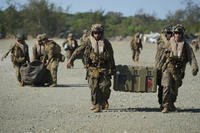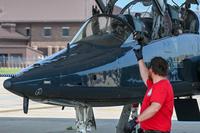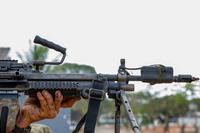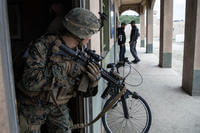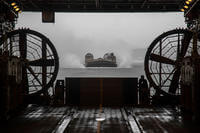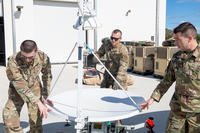The U.S. Navy is almost ready to bring its latest aircraft supercarrier Gerald R. Ford into the fleet after its last leg of testing, according to a news report.
The CVN-78, first in its class, will do its sea trials before Memorial Day weekend, Acting Navy Secretary Sean Stackley said Thursday after his speech at the U.S. Naval Institute's annual meeting in Washington, D.C., as reported by USNI News. The Navy will soon after accept the Ford's delivery into the fleet.
"Delivery -- pending the results of acceptance trials -- we expect to turn delivery around quickly after that," Stackley told the organization.
The $13 billion ship -- the first new carrier design in more than 40 years -- experienced engine setbacks in its main turbine generators, delaying the program. Furthermore, the ship faced numerous technological hurdles, such as problems with its electromagnetic catapults, that led to delays and cost overruns. Its original delivery date was set for September 2015.
Related story: Trump Says Ford-Class Carrier Catapults Are 'No Good'
"We have found issues that, as you look through [various programs], in the case of the Ford class, a very complex set of electrical system controls that in hindsight I don't think anybody could have anticipated," Vice Adm. Thomas Moore, commander of Naval Sea Systems Command, said during the Surface Navy Association's annual conference earlier this year.
During that conference, service officials said they expected to receive the ship in April pending the sea trials' outcome. But the Navy only finished its builder's trials April 14.
The builder's trials, conducted by its manufacturer, Huntington Ingalls Industries Inc., tested the most basic functions of the ship. The sea trials will test how the ship's navigation, power and communications operate at sea. The Navy's Board of Inspection and Survey will run these last tests, USNI reported.
Stackley reiterated the supercarrier's delivery will be contingent on whether any deficiencies are identified during acceptance trials, but said he remains "pretty confident" this will be a quick turnaround.
During his speech, Stackley also outlined priorities for the Navy in order to maintain superiority across all of its programs.
"Fixed-wing, unmanned off our carrier … operationally resilient space, stealth, electromagnetic … warfare, hypersonics, broader links, smarter weapons … artificial intelligence -- we'll need to bring these technologies, these capabilities, to the force to give a smaller fleet a punch that we're going to rely upon to make up for our shortfalls in terms of numbers in the fight," he said.
When a reserve lieutenant asked whether the Navy "puts too much out there" in terms of information about some of the technology programs mentioned, Stackley replied, "You are singing my tune."
"What you're describing is my concern, the secretary of defense's concern, it's the [chief of naval operations'] concern," the acting secretary said. "We have been far too forward leaning in terms of advertising."
Stackley's comments come a few months after CNO Adm. John Richardson put out a memo to 1,200 top admiral and civilian personnel to stop talking freely about Navy programs.
"[Defense Secretary Jim] Mattis basically instructed the department and informed the Congress because the Congress is a part of this -- Congress is trying to draw information out in a public forum to support budget [dialogue]," Stackley said. Anything out in the public forum may give cyber hackers the idea to try to "exfiltrate technical data."
He said that if any programs are even "leaning" toward classified, he prefers to share that information with officials behind closed doors "because we share too much."


